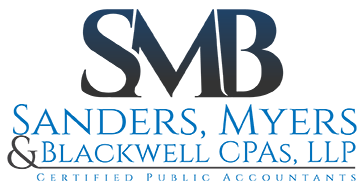

Meet Our Team
Sanders, Myers & Blackwell CPAs, LLP (SMB) is a full service CPA firm located in Springfield Missouri. We offer services for individuals, as well as small businesses to large corporations. From tax preparation, to bookkeeping, to consulting, we’re here to help each and every one of our clients.
We are a CPA firm with decades of experience working with every level of client, from individual tax filers to large, complex business organizations.We’re here for you.
We help our accounting clients solve problems. Given an opportunity, we are confident in our ability to find a practical solution for whatever accounting needs you may have.
We put the needs of our clients first, everything else will fall into place. We do it all with an unwavering commitment to our code of ethics. You will be proud to call us a part of your team.
What Our Clients Are Saying
Nakato
Having known Jake for several years I have come to respect his opinion and appreciate his willingness to be honest with me even if that means a different opinion than mine. When it comes to money management I want an accountant who guides me and also stands behind the decisions we come up with. I highly recommend working with this company.

FAQ
When are my taxes due?
The tax deadlines depend on the tax returns being filed. See below for common tax return filing deadlines for calendar year taxpayers:
| Type | Form | Deadline | Extension Deadline |
| Individual | 1040 | 4/15 | 10/15 |
| Partnership | 1065 | 3/15 | 9/15 |
| S Corporation | 1120S | 3/15 | 9/15 |
| C Corporation | 1120 | 4/15 | 10/15 |
| Nonprofit Corporation | 990 | 5/15 | 11/15 |
I received a notice from the IRS. Am I being audited? What should I do?
First things first, try not to stress out over IRS correspondence. Although it is important to respond timely and accurately to notices received from the IRS, not all of these notices are legitimate balances due or audits of taxpayer returns. The IRS sends correspondence for a myriad of reasons that may not have a negative impact on you as a taxpayer. This includes requests for more information, notification of delays in processing returns and identity verification. We have found the IRS to be incorrect in many cases; so, it is recommended that you get with your tax professional immediately to assess the severity of the correspondence and to assist with timely resolution. The worst thing you could do is ignore the correspondence. Rarely does it fix itself and burying it away could cost you a significant amount more in penalties and interest by not resolving it up front.
I am starting a new business. What type of entity should I setup?
One of the easiest and most flexible business entities to form is an LLC. An LLC provides asset protection while having the flexibility to be taxed as a sole proprietorship, partnership or S corporation. Each option has its benefits whether it is simplicity in operation, flexibility in ownership structure or tax avoidance strategies. There is no “one size fits all” option and as such, it is recommended that you sit down with your tax professional to evaluate what is the best fit for your needs.
I have years and years of business and tax information in storage. How long should I retain this information?
For tax purposes, the statute of limitations is generally three years from the date you file the tax return or two years from the date you actually pay the tax that is due. Generally, you are advised to retain your tax records for three years and to retain your employment tax records for four years. The following are instances where the general rule does not apply:
- You claimed a loss from worthless securities or bad debt deduction (7 years)
- You underreported income that is more than 25% of gross income on the return (6 years)
- You did not file a tax return or you filed a fraudulent tax return (Indefinitely)
Certain important business records should be retained permanently:
- Business ledgers
- Check registers
- Annual reports
- Business meeting minutes
- By-laws and amendments
- Business organizational documents
- Real estate and asset records (at least three year after disposition)
The following business records can be retained for seven years as a best practice:
- Accounts receivable and payable ledgers
- Invoices
- Expense reports
- Bank statements
- Credit card statements
- Human resource files
I have been asked to provide financial statements for my business. What should I do?
Financial statements are commonly required by investors, lenders and regulators. These stakeholders require differing levels of assurance in the preparation of the financials statements. Some allow for client-generated financials to be provided while others require businesses to engage accounting firms for the preparation of compiled, reviewed or audited financial statements. There is a significant difference in the level of assurance and level of work that is required to be performed in assuring accurate financial statement presentation between these options. The following is a simplified table that compares the differences:
| Type | Level of Assurance | Work Performed | Cost |
| Compilation | Lowest / None | Mostly reliant upon management provided balances. No assurance over accuracy of financial statements is provided. | $ |
| Review | Mid / Negative | Some testing of material balances; but, mainly reliant on inquiries and analytical testing to provide negative assurance over accuracy of the financial statements. | $$ |
| Audit | Highest / Positive | Corroborative evidence gathered and tested against balances. Understanding of internal controls over financial reporting required and positive assurance/audit opinion provided over accuracy of financial statements. | $$$$ |












